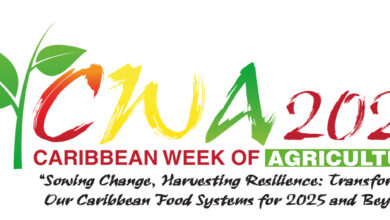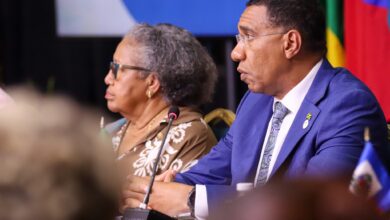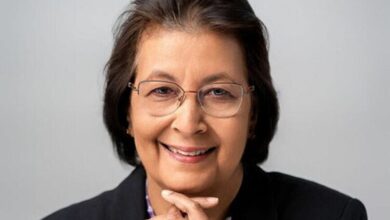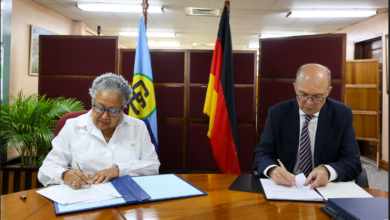Your Excellency, Michael Arneaud, President of the Permanent Council;
Your Excellency, Caesar Gaviria, Secretary-General of the OAS;
Your Excellency, Christopher Thomas, Assistant Secretary- General of the OAS;
Distinguished Ambassadors and Members of Staff of the Diplomatic Missions Accredited to the OAS;
Members of Staff of the OAS Secretariat;
Deputy Secretary-General and other Staff of the CARICOM Secretariat;
It is an honour for me to address the Permanent Council of the OAS this morning. It is an honour which I have had before as Secretary-General of the ACP and one which I will always cherish. Mr. Chairman though I am not the first Secretary- General of CARICOM to have been invited to address the Permanent Council, I am happy to have the privilege to do so on the happy coincidence of the 50th Anniversary of the OAS, the 25th Anniversary of the Caribbean Community and under the Chairmanship of my own national Ambassador. Such coincidences are rare and I am delighted that the occasion is being so appropriately marked. I will challenge any other CARICOM Secretary-General to match this coincidence of good fortune.
Mr Chairman, Mr Secretary-General, the Caribbean Community and Common Market (CARICOM) came into existence on July 4, 1973 with the signing of the Treaty of Chaguaramas in Trinidad and Tobago, by Barbados, Guyana, Jamaica and Trinidad and Tobago, converting the earlier (1968) looser free trade cooperation arrangement into a more structured Community and Common Market.
Over the succeeding years, the Membership of CARICOM grew to include Antigua and Barbuda, The Bahamas, Belize, Dominica, Grenada, Montserrat, St. Kitts and Nevis, Saint Lucia and St. Vincent and the Grenadines – all English-speaking countries. In 1995 Suriname became the first non-English speaking country to join the Community and in 1997, the Conference of Heads of Government – the supreme Authority of the Community – took the decision to accept Haiti as a member of the Community. The terms and conditions of Haiti’s accession are right now being worked out. Haiti’s accession will lead to a fifteen- member English, Dutch and French – speaking Caribbean Community with a population of approximately 15 million.
The Caribbean Community and Common Market is now working to become a Single Market and Economy. Fundamental to both the Community and Common Market and the Single Market and Economy is the principle of the coordination of Foreign Policies of the Member States. It is on the basis of this fundamental pillar of the integration process in the Caribbean Community, that we must take a look at CARICOM’s relations with OAS states and organisations.
In 1967 Trinidad and Tobago became the first English-speaking Caribbean State to secure membership in the OAS. Since that time, relations between the Caribbean sub-region and the Organisation have manifested a continuous process of expansion and intensification. This may be illustrated whether by reference to the accession of CARICOM Member States to the Charter of the OAS; the sub-region’s participation in the full range of the Organisation’s activities in the context of political, technical, economic and other forms of cooperation, or by reference to the prioritisation and intensification of relations between CARICOM Member States and other members of the Organisation, both at the bilateral level or as a group.
Today, Mr. Chairman, Mr. Secretary-General, all CARICOM Member States are full members of the OAS. Within the OAS, CARICOM Member States have been demonstrating ever increasing degrees of commitment to the Organisation. This commitment is evidenced by their constructive role in the various spheres of activity of the Organisation. This has been so as holders of critical positions in the Organisation, as recipients of the several forms of assistance dispensed by the Organisation, as leaders in the resolution of various problems confronting the Organisation, and as voices of concern at threats to the very values of the Organisation. In other words, I think it is fair to say that CARICOM countries have fully subscribed to the principles enshrined in our Charter. The eventual hemispheric and wider international initiative for the restoration of democratic government in Haitian initiative which found CARICOM Member States in the vanguard – provides an outstanding example as regards the Community’s contribution to this Organisation’s sub-regional achievements.
Mr. Chairman, Mr. Secretary-General, with respect to the promotion and intensification of relations between CARICOM Member States and other Member of the Organisation, over the years, numerous Agreements have been concluded between CARICOM Member States and several other Members of the OAS, in fields that span diplomatic relations, visa abolition agreements, agreements for scientific, technical and economic cooperation, delimitation of maritime boundaries, fishing, pollution management, air routes and a host of others. Significant elements of such cooperation include inter-sub-regional arrangements as exist between CARICOM and the Central American Republics and between CARICOM and “The Group of Three”. There are also agreements between CARICOM as a group and various individual countries, for example, the greements concluded by CARICOM with Chile, with Colombia and with Venezuela.
The ground work for many of these formal agreements have either been laid or reinforced by meetings at the highest political levels among the countries concerned.
One of the most historic agreements promoted by CARICOM was that establishing the Association of Caribbean States (ACS) which was signed in July 1994 in Cartagena de Indias, Colombia. I might add, Mr. Chairman, Mr. Secretary-General, that, reflecting what is perhaps the most concrete expression of open-regionalism in the hemisphere to date, the Association’s own membership includes members of the Andean Community, the Central American Integration System (SICA), the Group of Three and NAFTA in addition to CARICOM – whose membership also subsumes that of the OECS.
In this process, we must of course recognise the Agreement signed on 18 May, 1992 constituting as it does the formal cooperation instrument between the General Secretariat of the Organisation of American States and the Caribbean Community. It is in the implementation of that Agreement that my staff and I are here in Washington today.
Mr. Chairman, the process of expansion and intensification of CARICOM’s relations with the OAS outlined above is not only expected to continue but is poised for significant enhancement. The Representatives of the Member States of the Organisation, including CARICOM Member States gathered in this Special Session of the Permanent Council, are all fresh from the Second Summit of the Americas which convened in Santiago, Chile over the priod 18-19 April 1998. That Summit served to consolidate the process of joint action at the hemispheric level, in a number of areas selected from among those originally identified in the Plan of Action adopted at the first summit Meeting held in Miami, in December 1994, namely: Education, Democracy; Economic Integration and Free Trade; and the Eradication of Poverty and Discrimination.
The institutionalisation of the “Summit Process” as the centrepiece of hemispheric relations which seeks to address the vital concerns of the countries of the hemisphere, and which has identified a central role within that process for the OAS, is the single most important factor that sets the stage for “the significant enhancement” of CARICOM’s relations with the OAS and the hemishere, to which I have just referred.
Even as the Member States of CARICOM emphasise their commitment to this grand design for hemispheric integration, they have repeatedly drawn attention to the challenges inherent in this enterprise for the “smaller economies” and of the need for both the process and structures contemplated, to be designed in such a manner as to accommodate their particular circumstances. One particular initiative advanced by CARICOM, deriving as much from practical experience as from relevant analysis, is the establishment of a Regional Integration Fund. The justification for this mechanism inheres in the very process of integration between large and small, developed and developing economies. Nothing but political considerations can deny its validity.
Mr. Chairman, Mr. Secretary-General, the Charter of the Organisation of American States does not however directly address the question of size. Nonetheless, throughout its existence the Organisation has strongly advocated the principle of “the sovereign equality of States”. Also inasmuch as the Organisation’s Membership has from its inception included the smaller Republics of the Central American Isthmus and the Spanish-speaking States of the Caribbean, issues relating to small states can hardly be said to be novel themes of discourse in this forum. The admission of CARICOM States from 1967 onwards, resulting in the majority of the OAS States being smaller economies must also have served to further sensitise the Organisation to the concerns and interests of “Small States”.
As the hemisphere now embarks on the creation of the FTAA, the launching of the negotiations for which was a major outcome of the Santiago Summit, the Member States of CARICOM reiterate the need to observe the agreements and understandings previously reached and reaffirmed at the Summit, to incorporate measures that ensure the full and effective participation of the smaller economies in this historic adventure.
Neither this objective nor the efforts to combat the illegal traffic in drugs or to alleviate poverty would not be met by the reallocation of existing resources. This Organisation cannot afford to endanger Programmes keenly required, especially by the Smaller States, to finance the new programmes which, under the Summit process, will fall to it for implementation. Such action would only further weaken the capacity of the smaller economies to effectively participate in the Summit of the Americas process especially in the Free Trade Area of the Americas.
Moreover, should such reallocation involve shifting resources from areas such as technical assistance and scholarships/fellowships, not only will that diminish one of the critical benefits which the CARICOM Region enjoys from its membership of the OAS, but would also serve to undermine the educational thrust in the wake of a Summit which has placed education at the top of its priorities. Mr. Chairman, the entire question of additional resources for financing the Summit process is one which remains in need of further clarification.
As regards the area of technical assistance, Mr. Chairman, Mr. Secretary-General, let me take this opportunity to place on record our appreciation for the contribution of the OAS Trade Unit in developing a clear understanding of the implications of the process of integration between economies – large and small, developing and developed. We look forward to receiving continued assistance from this Unit as the negotiations for the FTAA gathers momentum.
Continuing CARICOM-OAS Cooperation does not however, rely solely on the Summit Process. Certain areas of unfinished business as exemplified by the scope for continued cooperation in Haiti, remain in need of our further joint support; from CARICOM’s standpoint, all the moreso as Haiti moves to finalise the arrangements for becoming the Fifteenth member of the Community.
Mr. Chairman, Mr. Secretary-General, the challenges faced by CARICOM at this juncture emanate not only from the hemispheric developments. In its traditional European theatre of economic, political and social interaction the fast approaching millennium brings with it new fundamental challenges to the old order.
The Lomé Convention, which for the last quarter of the century had embodied the trade, aid and development relationship between CARICOM countries and Europe expires at the end of February 2000. Arrangements of a fundamentally different nature are expected to govern those relations, post 2000. First of all, like the FTAA, the new arrangements will have to be designed against the background of a WTO rules based trading system. The indications of the nature of some of these differences – loss of preference, prior political commitment with stringent democratic human rights and Rule of Law requirements, reciprocal trade relations, less exclusive relations, etc. pose major questions for the region – the answers to which will need to be in harmony with the initiatives in this hemisphere of which CARICOM is a part.
The complications brought about by these various challenges is intensified by the timing of the various developments. The negotiation for a Free Trade Area of the Americas was launched at the just concluded Second Summit of the Americas and according to the new Chairman of the process – Canada. It is their intention to move at a brisk pace and to record significant progress by the year 2000.
At the same time, the negotiations for the post-Lomé IV successor agreement between the EU and the ACP countries is scheduled to be launched in September 1998 – that is five months following the launch of the negotiations for the FTAA.
Wedged between those two negotiating challenges facing CARICOM is the WTO negotiations in a number of critical areas. Following on the WTO Singapore Ministerial Meeting of December 1996, the WTO will be holding its next Ministerial meeting in Geneva within a month. On that agenda are issues of great relevance to both the FTAA and the post-Lomé IV negotiations. For those and other reasons, CARICOM cannot afford the luxury of non-participation or indifference to such meetings.
Mr. Chairman, Mr. Secretary-General, CARICOM recognises the virtue of diversifying its trade and economic relations; most critically by forging linkages with its neighbours in and around the Caribbean. Following its decision in 1992 to adopt a more “Caribbean basin” approach to development, CARICOM has sought to strengthen its trade and economic relations with neighbouring countries by embarking on and concluding agreements with Venezuela. Colombia and the Dominican Republic. All of these external trade and economic relations must, of course, be consistent one with the other and with the WTO. They also serve to provide a broader and stronger regional market from which CARICOM countries can launch the export drive which they must, if they are to survive much less prosper.
But the single most critical pillar on which CARICOM’s future, not merely its trade relationships, depends is the thrust towards its development into a Single Market and Economy – an objective slated for significant advancement by 1999. This undertaking to create a single economic space emanates from the 1989 Grand Anse Declaration of CARICOM Heads of Government and involves a fundamental revision of the Treaty of Chaguaramas which created CARICOM.
To date more than half of the nine protocols designed to amend that Treaty are virtually ready for signature by CARICOM Heads of State and Government at their upcoming Nineteenth Regular Summit to be held in Saint Lucia in early July. That Summit which will mark the 25th Anniversary of the Caribbean Community will see the signing of the Protocols on Industrial Policy (Protocol III), Trade Liberalisation/Common External Policy (Protocol IV), Agricultural Policy (Protocol V) and on Disadvantaged Countries, Regions and Sectors (Protocol VII).
The first two Protocols dealing with the creation of the new Community Structures of Unity and Governance of the Caribbean Community (Protocol I) and with the Provision of Services and Movement of Capital and the Right of Establishment (Protocol II) have already been signed and Protocol I is already in force. With the signing of the four Protocols envisaged for July, three would remain for signature – on Transport Policy (Protocol VI), on Disputes Settlement (Protocol VIII) and on Rules of Competition (Protocol IX) to complete the Treaty Revision process for the creation of the CARICOM Single Market and Economy.
A number of critical issues facing CARICOM and their resolution may in many ways amount to a redefining of the Community itself and of the way it conducts its affairs. A random choice of three of these issues exemplifies this situation. The recent initiative by CARICOM to help bring about a resolution to the post-December 15 electoral political crisis in Guyana has marked a new development by CARICOM as it seeks to pursue democracy in a Member State. Arising from this, many are calling for a permanent Electoral Advisory body as part of the Community’s arsenal of instruments. Given the universal priority attaching to the observance of democratic principles, including the observance of Human Rights and the Rule of Law, the possibility of this development may not be far off.
The Community has already taken a step in this direction when in 1997, it adopted a non legally binding Charter of Civil Society enshrining community-wide normative moorings for the governments and governed of the Community.
This recent enhanced political role of CARICOM is also evident in the efforts by the Community to help arrest the threat of political succession by Nevis in the Member State of St. Kitts and Nevis.
Another domain in which a redefinition of the role of CARICOM is emerging is in the area of juridical structures. For most of the CARICOM countries, the final court of Appeal has historically been the Privy Council – a special Committee of Law Lords of the House of Lords of the United Kingdom. Recent developments in both the UK and in the Caribbean seem set to bring the curtain down on this historical piece of the Region’s legal structure.
The present Government of the United Kingdom has indicated that consequent on its subscription to the European Convention rendering capital punishment unacceptable, it found itself in an undesirable position of sustaining a legal structure which is required to impose capital punishment in accordance with the laws of the countries of the Caribbean Community. The UK sees the resolution of this conundrum in the establishment by CARICOM States of alternative arrangements and has said so.
The CARICOM countries for their part have just about reached the end of a long process of decision-making as regards the establishment of a Caribbean Supreme Court with final appellate jurisdiction for the States party to the Court. It is hoped that this court will come into effect in time for the new millennium.
The third and final issue to which I wish to make reference, is the position of Cuba in CARICOM relations. This is not the place for a treatise on Cuba and I am not the one to give one in any case, but one cannot avoid Cuba if one is faced with the task of Caribbean development. After all, Cuba is a major Caribbean State.
CARICOM countries established diplomatic relations with Cuba in December 1972. Since then that relationship has been enlarged into in a Cuba-CARICOM Commission to develop economic, trade, technical, scientific and cultural relations between Cuba and CARICOM. The last meeting of the Commission took place in Havana in December 1997. Cuba has not sought membership of CARICOM but has applied for membership of the 71 member African, Caribbean and Pacific Group of States which is in cooperation with the 15 Member European Union through the Lome trade, aid and development cooperation agreement. The Caribbean supports that application.
Finally, Cuba’s continuing absence at the table of the Summits of the Americas is a source of concern to CARICOM and some other Hemispheric States. These concerns have been publicly expressed as well as the hope that the recently concluded Second Summit would be the last such occasion.
It is this general concern with Cuba’s position in the region which has also led some CARICOM voices to call for Cuba to move to what has been called “post revolutionary democracy”. CARICOM does not presume to be able to solve the issue of Cuba’s hemispheric relations, but it can neither deny, escape nor ignore it and therefore urges the search for a solution through constructive engagement and respect for political diversity, rather than exclusion and embargo.
These three examples point unmistakeably to an evolutionary process taking place in CARICOM as it prepares internally and in its external relations to face up to the challenges of the 21st century. In that process, this Organisation from which it has already benefitted significantly and to which it has contributed substantially and of which it now shares even higher expectations, can be of critical importance.
It is against this background and for this reason that we share the joy surrounding this 50th Anniversary and extend our congratulations to all those who have led and sustained this Organisation. We applaud especially its current leadership and membership and are proud to be a part of this unique achievement. It remains a beacon of hope for our future development and welfare. Long live the Organisation of American States!
I thank you.





